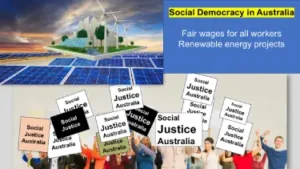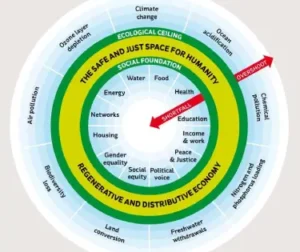From Neoliberalism to Social Democracy: A Path to a Fairer Australia
Discover how Australia can embrace social democracy to create a fairer society, balancing market economies with robust social protections.
Introduction
Australia’s transition from neoliberalism to a democracy based on social justice is essential for a fairer society. Australia has long been influenced by neoliberal policies that prioritize market freedom and corporate interests. These policies have led to increased economic inequality, weakened public services, and environmental degradation.
This article explores the damage caused by neoliberalism and advocates for a transition to social just democracy—a system that balances market economies with robust social safety nets and environmental sustainability, leveraging Australia’s monetary sovereignty to implement changes without burdening taxpayers or increasing taxes. By embracing a social just democracy, Australia can secure a more equitable future.
The Damage Caused by Neoliberalism
The Growing Economic Inequality in Australia
 Neoliberalism has drastically widened the wealth gap. The top 20% of households hold nearly 62% of Australia’s wealth, while the bottom 20% hold just 1%, according to the Australian Bureau of Statistics.
Neoliberalism has drastically widened the wealth gap. The top 20% of households hold nearly 62% of Australia’s wealth, while the bottom 20% hold just 1%, according to the Australian Bureau of Statistics.
Learn more about the history of neoliberalism in Australia to understand its deep-rooted impact on society.
For an indepth analysis of how a socially just democracy can reshape Australia, see this comprehensive report by The Guardian.
Public Services Undermined
Under neoliberalism, public services such as healthcare and education have suffered. Budget cuts and privatization efforts have led to overcrowded hospitals and underfunded schools. For example, the Australian Institute of Health and Welfare reports that public hospital wait times have increased significantly over the past decade.
Job Market Volatility

Neoliberal policies have resulted in a precarious job market characterized by part-time, casual, and gig employment. The Fair Work Commission notes that almost 40% of Australian workers are in insecure jobs, lacking stability and benefits. This shift undermines job security and worker rights.
Environmental Degradation
Neoliberalism prioritizes short-term profits over long-term sustainability. Australia’s carbon emissions have risen, and natural resources have been exploited unsustainably. According to the Climate Council, Australia is among the world’s largest per capita carbon emitters, contributing significantly to global climate change.
Political Influence and Corruption
Neoliberalism has led to increased corporate influence in politics. Lobbying and political donations have skewed policy-making towards corporate interests, undermining democratic processes. Transparency International’s Corruption Perceptions Index ranks Australia as a country with rising concerns about political integrity.
Why Social Just Democracy is the Best Path for Australia
Balanced Market Economy
A Social just democracy promotes a regulated market economy that safeguards public interests while encouraging sustainable growth. This balance ensures economic stability and fairness.
Universal Healthcare
Expanding and strengthening Medicare to provide comprehensive healthcare for all Australians is crucial. Universal healthcare reduces disparities in health outcomes and ensures everyone receives necessary medical attention.
Quality Education
Increasing funding for public schools, TAFE, and universities ensures accessible, affordable, and high-quality education. This investment in education fosters equal opportunities for all Australians.
Workers’ Rights
Enhancing job security and fair wages through robust labor laws protects workers from exploitation. Ensuring workers’ rights to organize and bargain collectively is essential for a fair workplace. Additionally, implementing regulations to keep unions honest and accountable ensures they work in the best interests of their members, promoting transparency and fairness within labor organizations.
Environmental Sustainability
Investing in renewable energy and green infrastructure is vital. Policies to combat climate change and protect natural resources ensure a sustainable future for Australia.
Progressive Taxation
Implementing fair and progressive tax policies reduces income inequality. Using public money to fund essential services and infrastructure benefits the entire community.
Example of Fair Progressive Taxation:
A progressive tax system means higher-income individuals pay a larger percentage of their income in taxes compared to lower-income individuals. For instance, a fair progressive tax model might include:
– 0% tax on annual incomes up to $20,000.
– 10% tax on annual incomes between $20,001 and $50,000.
– 20% tax on annual incomes between $50,001 and $100,000.
– 30% tax on annual incomes between $100,001 and $200,000.
– 40% tax on annual incomes over $200,000.
Example of Fair Corporate Taxation:
Corporate taxation should also be progressive, ensuring that larger and more profitable companies contribute a fair share to public revenues. For example:
– 15% tax on annual corporate profits up to $500,000.
– 25% tax on annual corporate profits between $500,001 and $5,000,000.
– 35% tax on annual corporate profits over $5,000,000.
This structure ensures that those with greater financial capability contribute more to public revenue, supporting essential services and reducing economic inequality.
Leveraging Australia’s Monetary Sovereignty
 Australia, as a sovereign currency issuer, has the ability to implement these changes without burdening taxpayers or increasing taxes. The government can fund public investments and social programs by creating money, a practice that is viable due to the country’s monetary sovereignty.
Australia, as a sovereign currency issuer, has the ability to implement these changes without burdening taxpayers or increasing taxes. The government can fund public investments and social programs by creating money, a practice that is viable due to the country’s monetary sovereignty.
- Funding Public Services
– The government can allocate funds for healthcare, education, and infrastructure directly from its central bank, ensuring these services are well-funded without increasing the tax burden on citizens.
- Investing in Green Infrastructure
– By creating money for investment in renewable energy projects, Australia can transition to a sustainable economy while generating green jobs and reducing carbon emissions.
- Supporting Workers and Communities
– Funding programs that support job security, fair wages, and community development can be achieved through government spending, bolstered by the country’s ability to issue currency.
Staying Within Earth’s Ecological Boundaries

Adhering to social democracy involves respecting and maintaining the planet’s ecological boundaries. This concept emphasizes sustainable practices that preserve the environment for future generations.
Importance of Ecological Boundaries
- Preventing Environmental Degradation
– Overstepping ecological boundaries leads to biodiversity loss, soil degradation, and water scarcity. Protecting these boundaries ensures the health of our ecosystems.
- Combating Climate Change
– Reducing carbon emissions and transitioning to renewable energy sources are crucial steps. Australia’s commitment to staying within ecological limits can significantly impact global climate efforts.
- Sustainable Resource Management
– Responsible use of natural resources, including water, minerals, and forests, is essential. Sustainable practices prevent resource depletion and promote long-term environmental health.
Strategies for Sustainability
- Investing in Renewable Energy
– Solar, wind, and hydroelectric power are key to reducing reliance on fossil fuels. Government funding and incentives can accelerate the adoption of renewable energy technologies.
- Promoting Sustainable Agriculture
– Supporting organic farming, reducing pesticide use, and encouraging crop rotation and diversity enhance soil health and reduce environmental impact.
- Enhancing Urban Sustainability
– Developing green infrastructure, such as public transport and energy-efficient buildings, reduces urban carbon footprints. Policies that promote recycling and waste reduction contribute to cleaner cities.
Implementing a Social Just Democracy in Australia
Policy Reform
Advocating for policies that prioritize public welfare over corporate profits is essential. Strengthening regulations to protect workers, consumers, and the environment is crucial for social democracy.
Public Investment
Increased funding for public services such as healthcare, education, and housing ensures a high quality of life for all Australians. Developing infrastructure projects creates jobs and improves public welfare.
Community Engagement
Fostering public participation in political processes through education and accessible platforms encourages democratic involvement. Supporting grassroots movements and community organizations enhances civic engagement.
Government Accountability
Promoting transparency and reducing corporate influence in politics ensures elected officials are accountable to citizens. Strengthening anti-corruption measures restores trust in the political system.
Summary
Neoliberalism has caused significant economic, social, and environmental damage in Australia. By transitioning to a socially just democracy and leveraging monetary sovereignty, Australia can achieve a more equitable and sustainable society.
A democracy based on social justice offers a balanced market economy, universal healthcare, quality education, strong workers’ rights, environmental sustainability, and progressive taxation. Implementing these principles through policy reform, public investment, community engagement, and government accountability will create a fairer and more just Australia.
Engage with Us
How do you think Australia can best implement a socially democratic system? Share your ideas on our Facebook: https://www.facebook.com/SocialJusticeAustralia.
Call to Action
Join our movement for a fairer Australia! Advocate for a democracy that works for most citizens today—get involved and make a difference!
FAQ Section Example:
Q: What is social democracy?
A: Social democracy combines a market economy with strong social policies to reduce inequality and ensure public welfare.
Q: How can Australia benefit from social democracy?
A: By transitioning to social democracy, Australia can create a more equitable society with better healthcare, education, and environmental sustainability.
Social Sharing and Trending Hashtags
Share this article on your social media to help build a movement for social democracy in Australia. Use the hashtags #SocialDemocracy, #EconomicReform, #EnvironmentalSustainability, #FairAustralia to enhance discoverability and engagement.
References
Australian Bureau of Statistics. (2023). Household Income and Wealth, Australia: https://www.abs.gov.au/statistics/economy/finance/household-income-and-wealth-australia/latest-release
Australian Institute of Health and Welfare. (2023). [Public hospital wait times: https://www.aihw.gov.au/reports-data/health-welfare-services/hospitals/overview
Fair Work Commission. (2023). Insecure Work: https://www.fwc.gov.au/documents/sites/award-review-2023-24/am202321-discussion-paper-job-security-181223.pdf
Climate Council. (2023). Australia’s Rising Carbon Emissions: https://www.climatecouncil.org.au/wp-content/uploads/2023/07/Climate-Council-submission-to-the-Climate-Change-Authority-on-targets-July-2023.pdf
Transparency International. (2023). Corruption Perceptions Index: https://www.transparency.org/en/cpi/2023/index/nzl


Loved the article and have made some comments in the attached doc.
Hi Nic, your attached article is interesting and I would agree with all the suggestions. The challenge is getting these changes implemented. It seems the political will is low and our political class are more focused on looking after their corporate mates and donors.